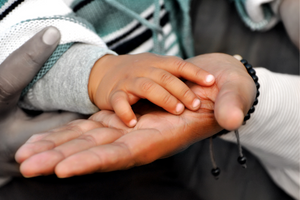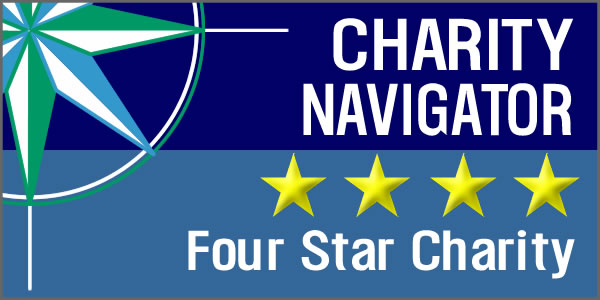
Usted está aquí
St. Ann's Center's Model of Care

A Model of Care, Centered on Mothers' Emotional Health Concerns
(Hyattsville, MD) When vulnerable young mothers arrive at St. Ann’s Center, most have experienced trauma of some sort in their lives. Often, these mothers have experienced physical or emotional abuse, are raising their young child (or children) on their own, and lack adequate housing and employment opportunities.
These factors often impact young mothers’ emotional well-being and can affect their relationships with others. Past traumas and cycles of foster care involvement can also result in mothers not having a secure attachment to their children.
St. Ann’s Clinical and Social Work Services (CSWS) team helps address these and other needs within a holistic Model of Care - developed to help mothers heal, grow, and progress towards positive life-long outcomes.
This trauma-informed, strengths-based, developmental Model of Care was piloted by Shaneen Alvarez, LCSW-C, LICSW, Director of CSWS, all under the umbrella of reflective practice.
Shaneen and her team - Interns, Case Managers, Social Workers and Clinical Consultants - practice this Model of Care by providing services to address various emotional and mental health concerns. Services include: assessments; individual, group and family therapy; and crisis management and intervention.
“New mothers and their children will stay at St. Ann’s for thirteen months on average," says Shaneen. "During this time, our agency-wide goal is to provide opportunities for these young mothers to connect with their infants, build healthy relationships, heal from trauma and thrive, and do so in an environment that is safe, culturally responsive, instills trust, and is empowering.”
The Model of Care as a Reflective Practice Lens for Residents and Staff
Shaneen has worked together with Director of Residential Programs, Jeanette Chittams, and Dr. Joy Kassett, Ph.D. to develop, refine and train St. Ann's staff on the Model of Care.
As a result, Residential Programs staff can utilize the same developmentally-focused reflective practice lens to help understand what residents are communicating through their actions, language and behaviors.
“Monthly group supervision of staff ensures that St. Ann’s Model of Care continues to provide a consistent, supportive environment for mothers in our programs, whether they are working on their goals with CSWS staff or Residential Program staff,” says Jeanette.
Residential Staff are supported through yearly training and regular individual and group supervision based in the Model of Care. Meanwhile, CSWS offers developmentally-focused therapy, crisis intervention, and after-care services to create a continuous and nurturing environment.
“A reflective practice approach considers the whole individual (mother) as it relates to her trauma history, functional strengths, and her developmental stage,” says Dr. Joy. “All while helping her to self-reflect, so that she can in turn, reflect upon and be curious about her child’s needs."
Through agency-wide support based on the Model of Care, mothers are able to securely bond with their children, and ultimately with others. Healthy relationships foster emotional stability – a skill that remains helpful long after residents transition from St. Ann’s.
Celeste Wallace, MSW, Social Work Case Manager, works directly with new clients in St. Ann's Hope House and Teen Mother-Baby programs to let them know that individual therapy is available, along with other supports.
“Some do accept [therapy services], and some don’t, based on their trauma and cultural history,” she said. “When this happens, I focus on listening to them to learn more, and this becomes therapeutic for them. It really helps to promote mental health awareness.”
As Celeste, the Social Work team, and Residential Staff communicate and connect with mothers through their reflective practice lens, St. Ann's continues to see an increase in residents seeking out mental health services and other emotional supports.
Supporting Mothers Beyond Their Time at
St. Ann's Center
Once mothers have successfully transitioned from St. Ann’s programs and have had time to reflect on their experiences, they frequently emphasize the value of having access to therapy services and consistent emotional support while at St. Ann’s.
Katina, who recently transitioned with her son to independent housing, advised mothers like herself:
“Use every opportunity here at St. Ann’s… I want to shout out ‘therapy’ – it’s free here and can benefit everyone, especially moms who have experienced trauma. I have also learned in my therapy with Dr. Joy that it takes time to become comfortable. Once I became comfortable, I reached some real epiphanies and insights that helped me.”
Joselyn, a mother of three who has thrived since transitioning in 2020, shared:
“One thing I have learned being a mom is that I am still healing from my own childhood. Therapy has been very helpful for me and I am a huge advocate for seeking therapy now. [My experience at St. Ann’s] has… made me view therapy in a new light. That was the best therapy I ever had. Just want to give a big thank you.”
Therapy and emotional supports are part of the many wrap-around services that help mothers prepare to write new futures for themselves and their families after St. Ann’s. However, the Model of Care doesn’t end when families transition.
“Our staff reinforces the message that support is still here after the mother and her child transition out,” says Shaneen. “This includes limited case management services for up to a year, including therapy and child care for their child, as we work to connect them to experts in the community.”
Like the mothers they serve, St. Ann’s CSWS staff and Residential staff continue to adapt and thrive as they refine and deliver their emerging Model of Care.
***
This article originally appeared in St. Ann's Center's Spring/Summer 2022 Newsletter.
To read this newsletter in its entirety, please visit the following page:
https://stanns.org/get-involved/newsletter


